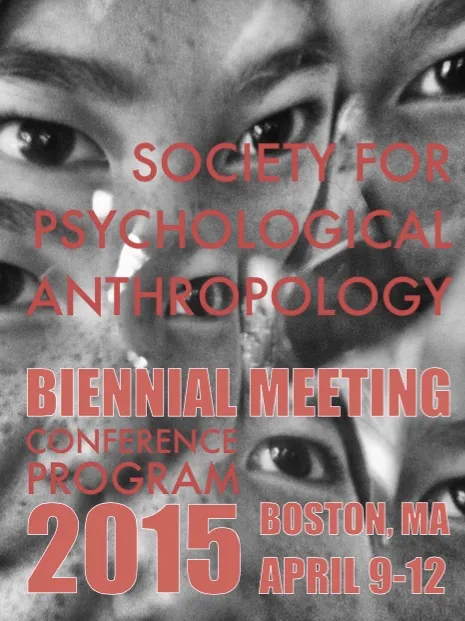SPA Biennial Meeting 2015
SPA Biennial Meetings 2015
Omni Parker House in Boston, MA
April 9-12, 2015
Plenary Sessions
The Biennial Meeting will include a Saturday plenary session on “Controversies in Global Mental Health” organized by Janis Jenkins (UCSD) and Byron Good (Harvard). Talks include:
- “We Don’t Know Enough”: The Challenge of Understanding Extraordinary Conditions – Janis Jenkins (UCSD)
- Dueling Nosologies: DSM and RDoC (Another Type of Culture War?) – Roberto Lewis-Fernandez (Columbia)
- Issues in the Global Study of Autism: Singularity, Fetishism, and Money – Roy Richard Grinker (George Washington University)
- Trauma, PTSD and Trauma Treatment: An Engaged Anthropologist’s Perspective on Debates in Global Mental Health – Byron Good (Harvard)
- Making Treatment Culturally Appropriate: Assessing for Cultural Syndromes and Related Catastrophic Cognitions – Devon Hinton (Harvard)
- What are Eating Disorders? Reconciling Diagnostic Fluidity, Social Invisibility, and Clinical Salience – Anne Becker (Harvard)
- Making Psychological Anthropology Relevant to Global Mental Health – Tanya Luhrmann (Stanford)
- The Struggle between Keeping the Society Safe and Keeping the Patients Well – Xin Yu (Peking University)
- Perspectives on Innovative Mental Health Governance in China and Indonesia: “Unlocking the Mentally Ill” – Mary-Jo Delvecchio Good (Harvard)
- Becoming Recovered and Moral Agency: Local and Global – Neely Myers (Southern Methodist University)
We will also have a Friday afternoon plenary entitled “Postcolonial Theory and Psychological Anthropology: A Conversation with Homi Bhabha” organized by Angela Garcia (Stanford) and Byron Good (Harvard). This panel brings Homi Bhabha, a seminal figure in postcolonial theory, into conversation with anthropologists studying different trajectories of postcolonial psychology. Drawing together a variety of ethnographic and critical perspectives, our focus is to address the social, political and historical issues affecting the postcolonial condition, to represent the impact of postcolonial criticism on psychological anthropology, and to explore the potential of postcolonial critique for politically engaged psychological anthropology. This panel asks: How is the postcolonial folded into subjectivity? What kinds of experience is addiction, madness, suicide or violence in relation to postcolonial history? How might postcolonial theory animate psychological anthropology, not only in terms of understanding the discursive and embodied elements of consciousness or suffering, but also in attending to the relationship between theory, method and knowledge? And is a focus on the postcolonial relevant for all societies and aspects of psychological anthropology, or of more limited relevance?
In addition to a keynote talk by Homi Bhabha (Harvard), commentaries will be offered by Vincent Crapanzano (Columbia), Angela Garcia (Stanford), Stefania Pandolfo (University of California at Berkeley), Lisa Stevenson (McGill), and Joao Biehl (Princeton).
Special Events
We will be hosting a breakfast event entitled “Methods that Matter”: Breakfast and Lectures from Robert LeVine and Tom Weisner. This breakfast event is an invitation to explore the benefits of mixed methods research with two leaders in the field. To launch our conversation, Robert LeVine (Harvard) will speak on “Repairing the Fractured Social Sciences: A Historical Perspective on Mixed Methods and their Rediscovery.” Tom Weisner (UCLA) will follow with a discussion of how combining methodologies leads to, as the title of his talk states, “Findings that matter.” These talks will illustrate the advantages of a restored social science, one that has come of age by doing the kind of integrative, holistic and often collaborative research our social science ancestors originally envisioned.
The “Methods that Matter” event will be held on Friday, April 10th from 8 – 9:45 AM. The lectures and discussion will be accompanied by a breakfast buffet, including:
- Cinnamon French Toast with Grand Marnier, Strawberry Butter and Maple Syrup
- Assorted Breakfast Pastries and Bagels with Cream Cheeses and Fruit Preserves
- Cut Fresh Fruit with Seasonal Berries
- Assorted Juices, Coffee and Teas
Tickets for the event are $20 per person. The event is subsidized in part by the Lemelson / SPA Conference Fund, made possible by a generous donation from the Robert Lemelson Foundation.
Our Saturday Night Banquet will include presentation of the 2015 Lifetime Achievement Award to Vincent Crapanzano, Distinguished Professor of Anthropology and Comparative Literature at the Graduate Center of the City University of New York (CUNY), and a talk by Paul Farmer, Kolokotrones University Professor of Global Health and Social Medicine at Harvard University. The banquet will be held on Saturday, April 11th beginning at 7 PM and will include a buffet dinner and cash bar.
On Thursday, April 9th at 2:15 p.m., we will host a workshop with Eli Lieber (Dedoose) and Tom Weisner (UCLA) entitled Qualitative Data Analysis Software: Dedoose as Exemplar.
For decades, qualitative data analysis software has been used in research and educational settings to improve efficiencies in the management and analysis of research data. Findings can be enhanced when these tools are understood, mastered, and their features are used effectively. At the same time, there are concerns about how these tools may impact how researchers produce data, analyze and interact with their data, and present evidence in publications and presentations. In this workshop, the Dedoose application will be introduced and used to illustrate how the typical tasks of qualitative researchers can be carried out in a relatively transparent and collaborative environment. For many years, traditional software packages with many overlapping features (Atlas.ti, NVivo, and MAXQDA) have been available. However, Dedoose was designed and developed to address unique challenges that could not be served by these other tools. Dedoose supports analyses of narratives, embedded images, and videos directly as qualitative data, as well as the integration of quantitative information on sources of these media in the form of surveys, assessments, observational data, and other data. As an entirely web-based application, Dedoose addresses a wide range of research team and research methods classroom needs. This history and the drivers behind the development of Dedoose will be discussed as well as how the tool’s structure and features have been designed to accommodate the needs of teams working across disciplines and using diverse methods, and integrating the types of data collected in mixed methods studies. Finally, a variety of research findings generated by the use of Dedoose will be presented and discussed to illustrate how Dedoose features were capitalized upon to serve the particular needs of various projects.
On Thursday, April 9th at 4 p.m. we will be hosting a workshop entitled “Getting the Grant: National Science Foundation (NSF) Funding for Psychological Anthropology” led by Eileen Anderson-Fye (Case Western Reserve University). The workshop will cover the basic principles of successful NSF proposal writing, various NSF funding mechanisms, review processes, co-reviewing and common pitfalls among psychological anthropology applications. Senior grants; other senior mechanisms for individuals, conferences and training programs; and mentoring student grant applications will be addressed. The workshop will include a presentation and discussion time.
Professor Anderson-Fye has received a number of NSF grants including senior research grants, EAGER support, and student training supplements in addition to supervising Doctoral Dissertation Improvement Grants (DDIG). She also regularly serves on the anthropology senior review panel for NSF.
On Sunday, April 12th at 10:15 am, Robert Lemelson (Elemental Productions) will offer a Workshop on the Integration of Visual and Psychological Anthropology.
With the advent of digital media and the ease and low cost of its associated technology, video is being increasingly used in psychological anthropological research. Researchers frequently film their subjects, but beyond basic coding for the extraction of data often lack a clear rationale just how and in what ways this material will be utilized. In addition some of the fundamentals of visual literacy, at minimum, are being sacrificed due to the lack of knowledge and experience with the basics of cinematic conventions, techniques and approaches. Researchers rarely consider the transformation of their visual material into any form much beyond basic teaching material. This is unfortunate because film has the capacity to illuminate the core issues of our field and disseminate these to communities outside of the insular world of academia.
This workshop redresses these deficits by introducing the participants to some of the basics of ethnographic filmmaking as it applies to issues relevant to psychological anthropology and will cover both theoretical and practical issues involved in doing longitudinal ethnographic filmmaking at the intersection of psychological, medical and visual anthropology. Topics will include: narrative forms; issues raised in exploring sensitive, dangerous or stigmatized subject material; the uses of film as a tool in research, education and advocacy; person centered ethnography and intersubjectivity in ethnographic filmmaking; and ethical issues.
Finally, on Sunday, April 12th beginning at 1:00 pm, the SPA will feature a special session entitled Psychoanalysis and Psychological Anthropology in Conversation featuring discussion among psychoanalysts from the Boston Psychoanalytic Society and Institute and psychological anthropologists who regularly engage psychoanalytic concepts in their research, including Robert Paul (Emory), John Borneman (Princeton), Ellen Corin (McGill), Doug Hollan (UCLA), and Alasdair Donald (Harvard).
Conference Hotel
Opened in 1885, the elegant Omni Parker House is located in the heart of downtown Boston with easy access to the Boston Common, Beacon Hill, and a wide variety of Boston’s many attractions. Special conference rates of $219 for double rooms and $269 for suites are available for conference attendees through the Omni Parker House’s Conference Website. Conference room rates are available for three days before and after the conference based on availability, and availability is extremely limited. Conference rates are available until March 16th, 2015.
International Early Career Scholars
Funding for international graduate students and early career scholars will be available to attend the meetings through the SPA’s new International Early Career Scholar Travel Grant program. We anticipate awarding three grants up to $2,000. If you are organizing a session, please consider inviting an international scholar.
Book Exhibit
The Scholar’s Choice will be managing the book exhibit for our biennial meeting. It may be possible for your recently published books to be included in their display. Anyone interested in having their book displayed at the meeting should contact their publisher as soon as possible to see if the press would be willing to send the book for the exhibit. The Scholar’s Choice displays on behalf of the publishers and all requests must come from them, not the individual authors.
Publishers who are unable to attend, but wish to have titles exhibited should contact Mary Lynn Howe by email (mlh@scholarschoice.com) or phone (585-262-2048 xt 111) for more information.

